Small overlap front: driver-side
Rating applies to 2013 models
Tested vehicle: 2013 Chevrolet Malibu Eco 4-door
The Chevrolet Malibu was redesigned for the 2013 model year.
| Evaluation criteria | Rating |
|---|---|
| Structure and safety cage | |
| Driver injury measures | |
| Head/neck | |
| Chest | |
| Hip/thigh | |
| Lower leg/foot | |
| Driver restraints and dummy kinematics The dummy’s head barely contacted the frontal airbag before sliding off the left side as the steering column moved 14 cm to the right, leaving the head vulnerable to contact with forward structure. Additionally, the seat belt allowed excessive forward excursion of the dummy’s head and torso. The side curtain airbag deployed and had sufficient forward coverage to protect the head from contact with side structure and outside objects. |
|
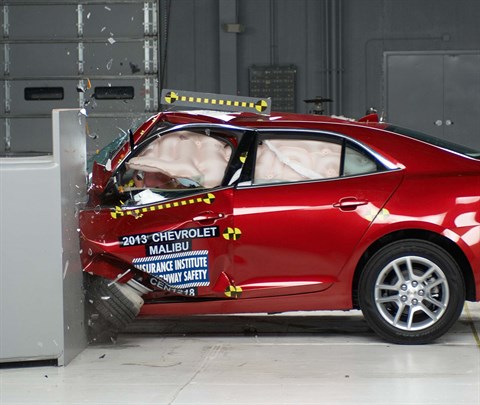
Action shot taken during the small overlap frontal crash test.
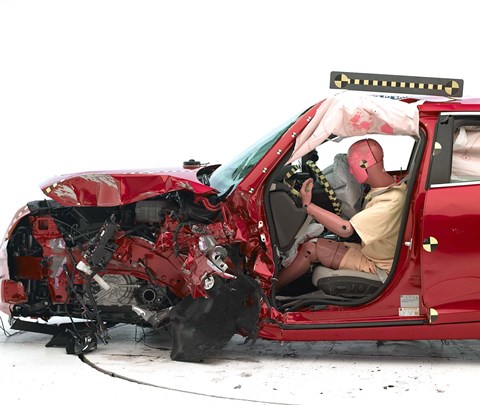
The dummy's position in relation to the door frame, steering wheel, and instrument panel after the crash test indicates that the driver's survival space was not maintained well.

During the crash, the dummy's head barely contacted the frontal airbag before sliding off to the left as the steering column moved to the right. The seat belt allowed the dummy to move too far forward, as is evident from the gap between the seat back and the dummy's torso.
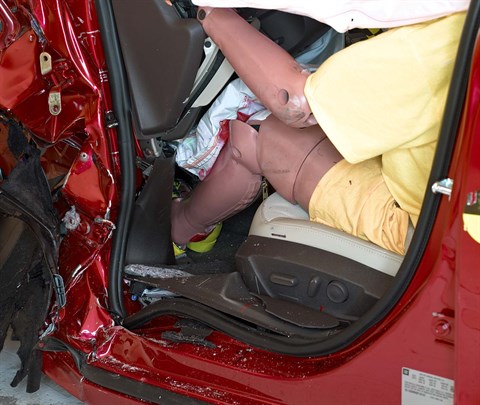
Door hinge pillar and instrument panel intrusion contributed to a significant risk of injury to the left knee and a moderate risk to the left lower leg.
Measures of occupant compartment intrusion on driver side
| Evaluation criteria | Measurement |
|---|---|
| Test ID | CEN1218 |
| Lower occupant compartment | |
| Lower hinge pillar max (cm) | 21 |
| Footrest (cm) | 15 |
| Left toepan (cm) | 7 |
| Brake pedal (cm) | 4 |
| Parking brake (cm) | 0 |
| Rocker panel lateral average (cm) | 3 |
| Upper occupant compartment | |
| Steering column | 5 |
| Upper hinge pillar max (cm) | 15 |
| Upper dash (cm) | 18 |
| Lower instrument panel (cm) | 16 |
Driver injury measures
| Evaluation criteria | Measurement |
|---|---|
| Test ID | CEN1218 |
| Head | |
| HIC-15 | 41 |
| Peak gs at hard contact | no contact |
| Neck | |
| Tension (kN) | 1.5 |
| Extension bending moment (Nm) | 21 |
| Maximum Nij | 0.37 |
| Chest maximum compression (mm) | 18 |
| Femur (kN) | |
| Left | 5.5 |
| Right | 0.3 |
| Knee displacement (mm) | |
| Left | 17 |
| Right | 1 |
| Knee-thigh-hip injury risk (%) | |
| Left | 4 |
| Right | 0 |
| Maximum tibia index | |
| Left | 0.83 |
| Right | 0.40 |
| Tibia axial force (kN) | |
| Left | 2.8 |
| Right | 1.2 |
| Foot acceleration (g) | |
| Left | 79 |
| Right | 43 |
Moderate overlap front: original test
Rating applies to 2013-15 models
Tested vehicle: 2013 Chevrolet Malibu Eco 4-door
The Chevrolet Malibu was redesigned for the 2013 model year. For the 2016 model year only, the Malibu was renamed the Malibu Limited and sold when new only to fleets. The Malibu Limited shares no ratings with the redesigned 2016 Chevrolet Malibu.
Moderate overlap frontal ratings are assigned by the Institute based on a test conducted by General Motors.
| Evaluation criteria | Rating |
|---|---|
| Overall evaluation | |
| Structure and safety cage | |
| Driver injury measures | |
| Head/neck | |
| Chest | |
| Leg/foot, left | |
| Leg/foot, right | |
| Driver restraints and dummy kinematics | |
Measures of occupant compartment intrusion on driver side
| Evaluation criteria | Measurement |
|---|---|
| Test ID | VTF1114 |
| Footwell intrusion | |
| Footrest (cm) | 3 |
| Left (cm) | 5 |
| Center (cm) | 6 |
| Right (cm) | 5 |
| Brake pedal (cm) | 2 |
| Instrument panel rearward movement | |
| Left (cm) | 0 |
| Right (cm) | 0 |
| Steering column movement | |
| Upward (cm) | 0 |
| Rearward (cm) | -6 |
| A-pillar rearward movement (cm) | 1 |
Driver injury measures
| Evaluation criteria | Measurement |
|---|---|
| Test ID | VTF1114 |
| Head | |
| HIC-15 | 327 |
| Peak gs at hard contact | no contact |
| Neck | |
| Tension (kN) | 0.8 |
| Extension bending moment (Nm) | 25 |
| Maximum Nij | 0.26 |
| Chest maximum compression (mm) | 26 |
| Legs | |
| Femur force - left (kN) | 0.5 |
| Femur force - right (kN) | 0.9 |
| Knee displacement - left (mm) | 1 |
| Knee displacement - right (mm) | 1 |
| Maximum tibia index - left | 0.33 |
| Maximum tibia index - right | 0.31 |
| Tibia axial force - left (kN) | 2.2 |
| Tibia axial force - right (kN) | 2.6 |
| Foot acceleration (g) | |
| Left | 51 |
| Right | 58 |
Side: original test
Rating applies to 2013-15 models
Tested vehicle: 2013 Chevrolet Malibu Eco 4-door with standard front and rear head curtain airbags and standard front seat-mounted torso airbags
The Chevrolet Malibu was redesigned for the 2013 model year. Initially, only the Eco model (a hybrid with a gasoline engine and an electric motor powered by a lithium-ion battery) was available in the new design. Other Malibu models with conventional powertrains were introduced later, when side torso airbags for rear seat occupants were made standard (they had been optional earlier). All Malibu models built after July 2012 have the standard rear side torso airbags. (Information about when a specific vehicle was manufactured is on the certification label typically affixed to the car on the driver door or adjacent B-pillar.)
Two side tests of the Malibu Eco were initially conducted, one by the Institute and one by General Motors. Neither car had the optional rear side torso airbags. A third test, this time of a Malibu LTZ with the standard rear side torso airbags, was then conducted by General Motors. Rear seat dummy torso injury measures improved for the third car, but each of the three tests produced good injury ratings for the rear seat dummies. Therefore, the ratings below are based on all three tests. Photos and videos are provided for the Institute test car.
For the 2016 model year only, the Malibu was renamed the Malibu Limited and sold when new only to fleets. The Malibu Limited shares no ratings with the redesigned 2016 Chevrolet Malibu.
| Evaluation criteria | Rating |
|---|---|
| Overall evaluation | |
| Structure and safety cage | |
| Driver injury measures | |
| Head/neck | |
| Torso | |
| Pelvis/leg | |
| Driver head protection | |
| Rear passenger injury measures | |
| Head/neck | |
| Torso | |
| Pelvis/leg | |
| Rear passenger head protection | |
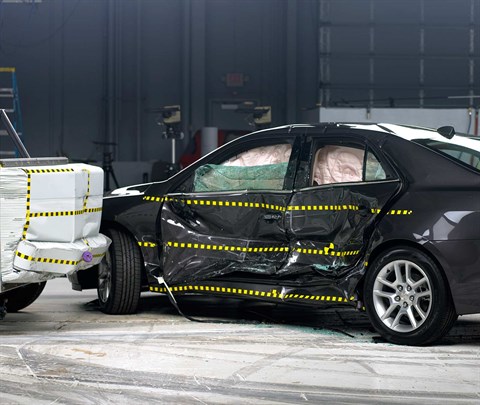
View of the vehicle and barrier just after the Institute's crash test.

View of the vehicle after the crash with doors removed, showing the side airbags and damage to the occupant compartment.
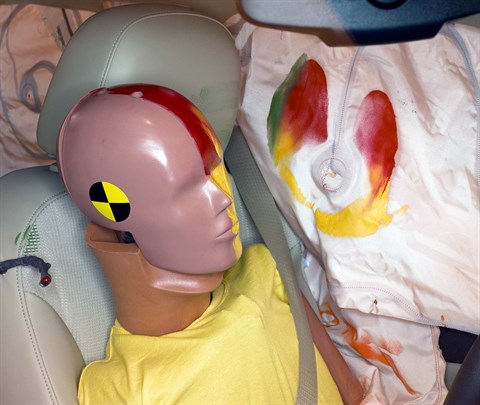
Smeared greasepaint shows where the driver dummy's head was protected from being hit by hard structures by the side curtain airbag in the Institute's test.
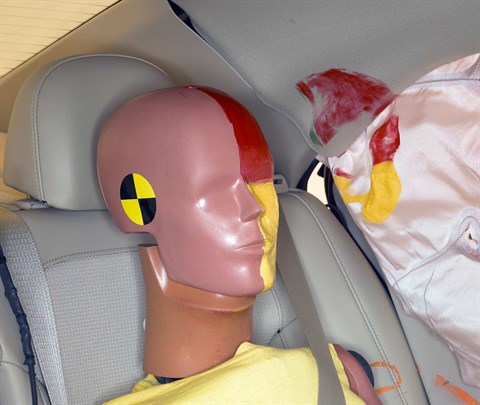
Smeared greasepaint shows where the rear passenger dummy’s head was protected by the side airbag.
Measures of occupant compartment intrusion on driver side
| Test ID | VTS1116 | CES1205 | VTS1204 |
|---|---|---|---|
| B-pillar to longitudinal centerline of driver's seat (cm) | -15.5 | -16.5 | -18.0 |
| Negative numbers indicate the amount by which the crush stopped short of the seat centerline. | |||
Driver injury measures
| Evaluation criteria | Measurement | ||
|---|---|---|---|
| Test ID | VTS1116 | CES1205 | VTS1204 |
| Head HIC-15 | 440 | 310 | 390 |
| Neck | |||
| Tension (kN) | 1.4 | 1.3 | 1.2 |
| Compression (kN) | 0.2 | 0.2 | 0.2 |
| Shoulder | |||
| Lateral deflection (mm) | 50 | 40 | 43 |
| Lateral force (kN) | 1.6 | 1.6 | 1.8 |
| Torso | |||
| Maximum deflection (mm) | 41 | 44 | 45 |
| Average deflection (mm) | 36 | 35 | 40 |
| Maximum deflection rate (m/s) | 4.21 | 3.65 | 5.24 |
| Maximum viscous criterion (m/s) | 0.66 | 0.68 | 0.79 |
| Pelvis | |||
| Iliac force (kN) | 2.2 | 1.8 | 1.2 |
| Acetabulum force (kN) | 3.3 | 2.1 | 2.7 |
| Combined force (kN) | 4.9 | 3.5 | 3.7 |
| Left femur | |||
| L-M force (kN) | 1.0 | 0.9 | 0.7 |
| L-M moment (Nm) | 31 | 58 | 22 |
| A-P moment (Nm) | 126 | -33 | 99 |
Passenger injury measures
| Evaluation criteria | Measurement | ||
|---|---|---|---|
| Test ID | VTS1116 | CES1205 | VTS1204 |
| Head HIC-15 | 330 | 310 | 140 |
| Neck | |||
| Tension (kN) | 0.4 | 0.2 | 0.2 |
| Compression (kN) | 0.6 | 0.8 | 0.7 |
| Shoulder | |||
| Lateral deflection (mm) | 44 | 32 | 13 |
| Lateral force (kN) | 1.6 | 1.1 | 0.8 |
| Torso | |||
| Maximum deflection (mm) | 41 | 30 | 20 |
| Average deflection (mm) | 32 | 23 | 16 |
| Maximum deflection rate (m/s) | 3.64 | 3.48 | 2.39 |
| Maximum viscous criterion (m/s) | 0.64 | 0.32 | 0.18 |
| Pelvis | |||
| Iliac force (kN) | 0.4 | 0.2 | 0.2 |
| Acetabulum force (kN) | 2.1 | 1.8 | 1.7 |
| Combined force (kN) | 2.4 | 1.9 | 1.9 |
| Left femur | |||
| L-M force (kN) | 0.7 | 0.4 | 0.5 |
| L-M moment (Nm) | 18 | 128 | 50 |
| A-P moment (Nm) | 68 | -92 | 98 |
Roof strength
Rating applies to 2013-15 models
Tested vehicle: 2013 Chevrolet Malibu Eco 4-door
For the 2016 model year only, the Malibu was renamed the Malibu Limited. Its roof rating is shared with 2013-15 models of the Malibu.
| Overall evaluation | |
|---|---|
| Curb weight | 3,583 lbs |
| Peak force | 18,721 lbs |
| Strength-to-weight ratio | 5.22 |
Head restraints & seats
Seat type: Manual power cloth seat
| Overall evaluation | |
|---|---|
| Dynamic rating | |
| Seat/head restraint geometry |
| Seat type | Manual power cloth seat |
|---|---|
| Geometry | |
| Backset (mm) | 26 |
| Distance below top of head (mm) | 9 |
| Seat design parameters | |
| Pass/fail | Pass |
| Max T1 acceleration (g) | 12.3 |
| Head contact time (ms) | 56 |
| Force rating | 1 |
| Neck forces | |
| Max neck shear force (N) | 0 |
| Max neck tension (N) | 300 |
About the head restraint & seat test
Currently, IIHS tests apply only to front seats.
